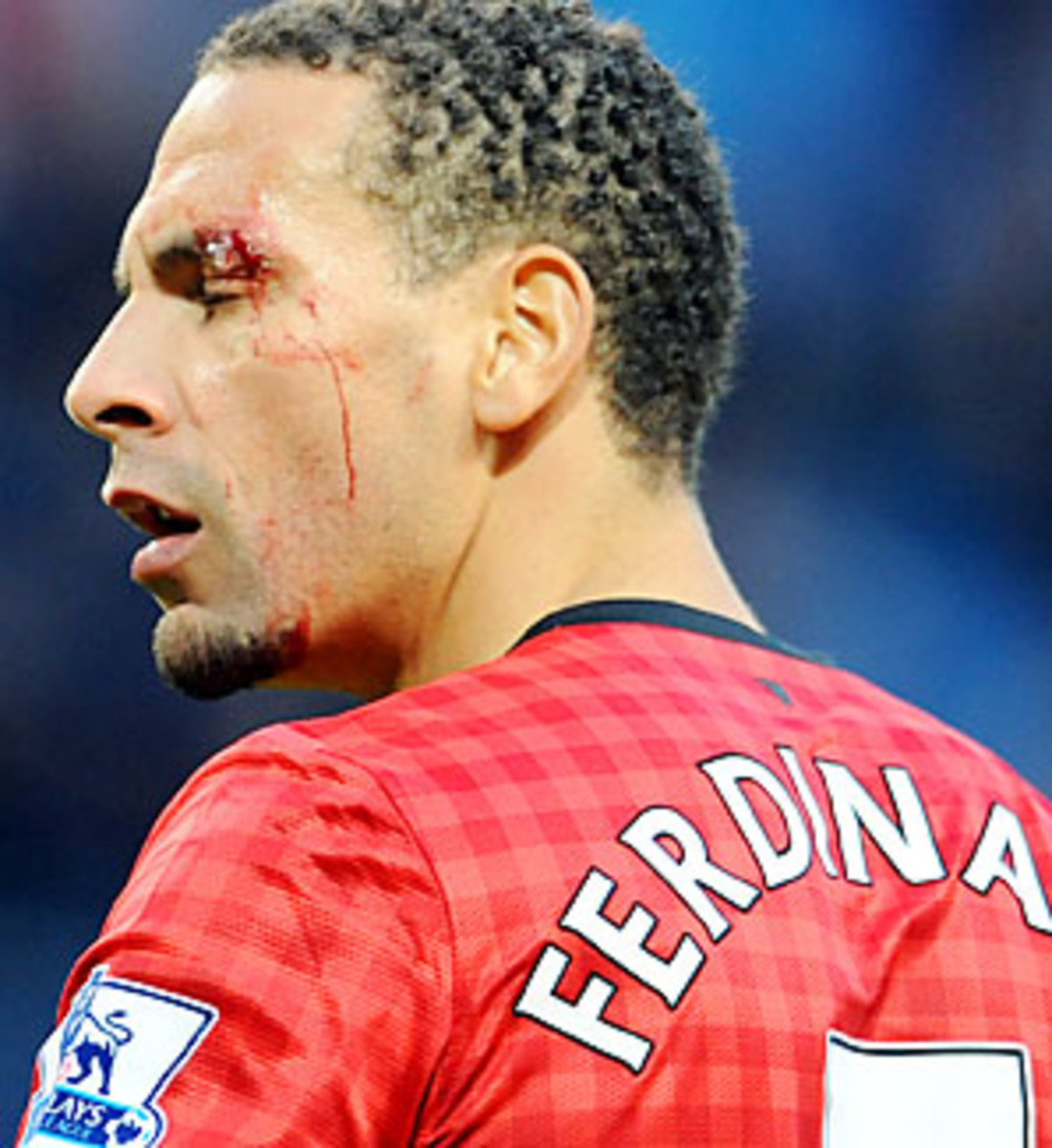
Racism, crowd trouble mar Manchester derby
Another Premier League weekend scarred by racist abuse, and the coin attack that left Rio Ferdinand dripping in blood at the Manchester derby, has English authorities fearing a return to the spite-filled climate when the country was a footballing outcast.
Despite English football fans being praised last month by FIFA President Sepp Blatter as positive examples for the world, unrest at globally televised Premier League matches looks to be mounting to revive memories of the hostilities in the 1970s and 80s.
"To see Rio Ferdinand with blood on his face is absolutely terrible,'' English Football Association chairman David Bernstein said Monday. "I think it's disturbing that we're seeing a recurrence of these types of incidents.
"We've had racial abuse issues, the odd pitch incursion, things being thrown at players. It's very unacceptable and has to be dealt with severely.''
Prosecutors acted swiftly Monday to charge nine men in connection with disorder at the previous day's top-of-the table derby in which Manchester United won 3-2 at Manchester City.
They included the fan who invaded the pitch to confront Ferdinand after the bloodied United defender had been struck by a coin during the celebrations for Robin van Persie's stoppage-time winner. A fan heard by officers allegedly hurling racial abuse at the Etihad Stadium will also face court.
On Saturday, Norwich's 4-3 victory at Swansea was also overshadowed by a man being arrested for allegedly racially abusing Canaries defender Sebastien Bassong, one of four cases of apparent racism directed at the Cameroon center back in the past two weeks.
"It's very disappointing - so much of football is so good, great things are happening in football as a whole, but these odd incidents get the headlines - and understandably because they are serious matters, they are unforgivable things,'' Bernstein said on Sky Sports television.
"When you think of the millions watching football every week, or involved in football, to see it hijacked by these incidents is awful, so we have to deal with it in the strongest way we can.''
During English football's darkest period in the 1980s, hooliganism led to club sides being banned from playing in European competitions for five years.
But since then English football has been credited with cleaning up its image to the extent where Blatter believes the country is setting an example to the world.
Reflecting last month on the blissful crowds at Olympic football matches in Britain in July and August, Blatter said he hoped the spirit "would be transported ... all around the world, where in all football matches you can sit together and there are no clashes or disputes.''
Yet only days after he spoke, a London derby at Tottenham was marred by West Ham fans hurling anti-Semitic abuse and performing Nazi salutes.
Herman Ouseley, the head of English football's anti-racism body, fears there is a "nastiness creeping back into society ... bigotry and hatred.''
"People take those characteristics into football to ease their frustrations,'' Ouseley said.
Bernstein also attributed the recent racism cases and crowd unrest to a "difficult social problem.''
"I think there's a copycat thing,'' he said. "Something happens and other people copy it, and this sort of thing can spiral.''
In the past year, there has been a spate of arrests for racism at Premier League matches, while Liverpool striker Luis Suarez and Chelsea captain John Terry have served bans for racially abusing opponents.
"It's important that matters are brought to a head and people understand that there is no room for this in football at all, and we'll do everything we can within the FA,'' Bernstein said. "I know the rest of football feels the same, it's a blot on the game.''
As the FA investigates Sunday's incidents, the FA is encouraging clubs to impose life bans on those found guilty of misconduct at matches.
The pitch invader from Sunday's Manchester derby, who had to be restrained by City goalkeeper Joe Hart, has issued an apology and acknowledged the damage his unruly actions have caused English football.
"I am extremely ashamed of my actions. I have let myself down, my family down, my fellow fans down and Manchester City Football Club,'' the 21-year-old Matthew Stott said in a statement released by his legal team. "I intend to write personally to Mr. Ferdinand to express my extreme regret and apologize, and also apologies to Manchester United and their fans.''
Ahead of Stott's court appearance, City has removed the season ticket from the landscape gardener from Knutsford, south of Manchester, and he is now facing a life ban from the club.
Solicitor Rebecca Caulfield insisted that Stott was not a "stereotypical drunken football fan.''
"He is embarrassed and ashamed of his temporary moment of madness that has brought wider consequences on the club he supports and his fellow fans,'' Caulfield said.





